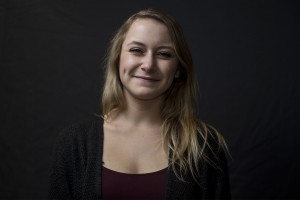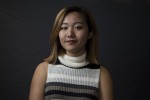After getting into a fight with her father at 1 a.m., Kayla He went to her room and ate as many chicken fingers and pizza slices as she could.
An hour later, she felt so guilty that she went to the gym instead of sleeping and ran until she could not run anymore, she said. She began feeling guilty about eating in early 2013, and only stopped last year. He, a first-year pre-communications studies student, will publicly discuss her past eating disorder for the first time at an event Thursday.
The National Eating Disorders Association defines an eating disorder as a serious emotional or physical behavior or attitude involving food or weight issues.
The Body Image Task Force and Active Minds, two committees in the undergraduate student government Student Wellness Commission, are holding a series of events at UCLA this week to recognize National Eating Disorder Awareness Week. He will speak at an event Thursday called “My Broken Reality: Exploring BDD and Eating Disorders.”
This is the second year that SWC is hosting events for the week on campus.
Danielle de Bruin, the director of the Body Image Task Force at UCLA, said the group’s goal is to inform students about what they should do if they have an unhealthy relationship with food.
He said she began extreme dieting at a young age partly because of the extreme beauty standards and lack of education on mental health and body image in China, where she grew up. She added people in China often avoid speaking about emotions because they do not want to seem weak, and therefore she did not realize the state of her own mental health.
“You have to be super skinny to be considered beautiful,” she said. “(There’s) a thing that when you are pushing down your mental health, you are considered strong.”
Most days, He said she would eat only one meal a day, and would feel extremely guilty if she ever ate more.
“One time my dad brought me a drink trying to persuade me that there was no sugar added,” she said. “I lied that I drank it and poured it out of the window. I felt like I was being good to my body. Looking back, it’s scary.”
She said she has now become healthier, and she will focus her speech Thursday on the stigma that exists in our society around talking about eating disorders.
“I honestly don’t really talk about this with my friends,” He said. “They know what I’ve been through … but I’ve never really called it an eating disorder in front of them. This is the first time I (will) recognize myself as someone with an eating disorder to the public.”
Sophia Arim, a fourth-year history student, said she thinks the awareness week will show students with eating disorders that they are not alone and there are resources on campus that help.
Arim also said she fought an eating disorder, and a significant part of her recovery occurred when she started visiting Counseling and Psychological Services and seeing a nutritionist.

She developed her eating disorder in her second year of college when she began counting calories and working out five times a week, she said.
On a typical day, she would only have coffee in the morning, a fruit cup during the day and a salad for dinner. She would avoid going to social events where there was food or alcohol because she did not want to explain why she was not drinking or eating.
“I felt better about myself when I ate less than other girls around me,’’ Arim said. “If a girl around me was eating a sandwich, I would make sure I ate less than her.’’
She said her experience was isolating and she began losing contact with many of her friends. The eating disorder started to affect her life significantly at the end of her second year, when she started failing some classes, found it hard to wake up in the morning and became cranky all the time.
Arim said that when the problem was at its worst, she started purging, or making herself vomit, a couple of times a week.
In 2015 for example, she and her friend had VIP tickets to go to a G-Eazy concert together, and she wanted to feel skinny because they were meeting a celebrity.
“The day before, I took my friend to Sprinkles Cupcakes and I had a cupcake,” she said. “I couldn’t stop thinking about it on the way home, and as soon as I got back to my dorm I pretended to feel sick and locked myself in the handicapped bathroom so I could purge.’’
Arim said she sought help and opened up to her parents over the summer. She said the most difficult part of recovery was coming to terms with the problem.
“I think I have a lot more confidence,’’ Arim said. “Of course whenever I eat, the eating disorder is always there. But I relearned how to be in touch with my body.’’
He said she has never been as open about her eating disorder as she is now and she is excited to speak at Thursday’s event.
“I can’t be afraid to talk about it,’’ He said. “I want to see changes in how society talks about eating disorders and (hopefully) my story will contribute to it.’’
